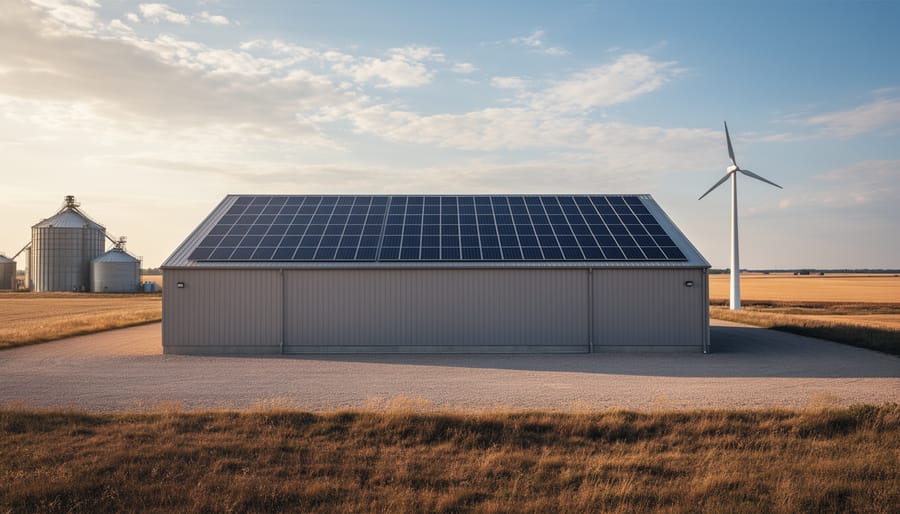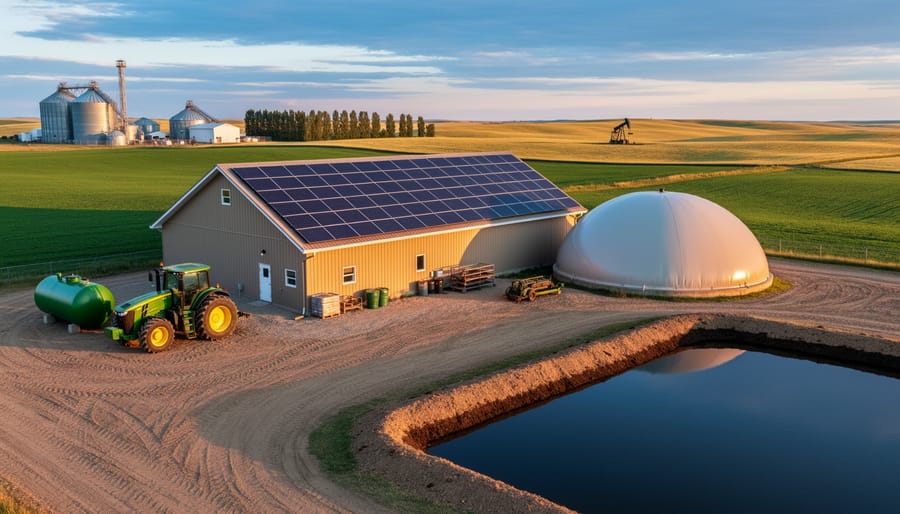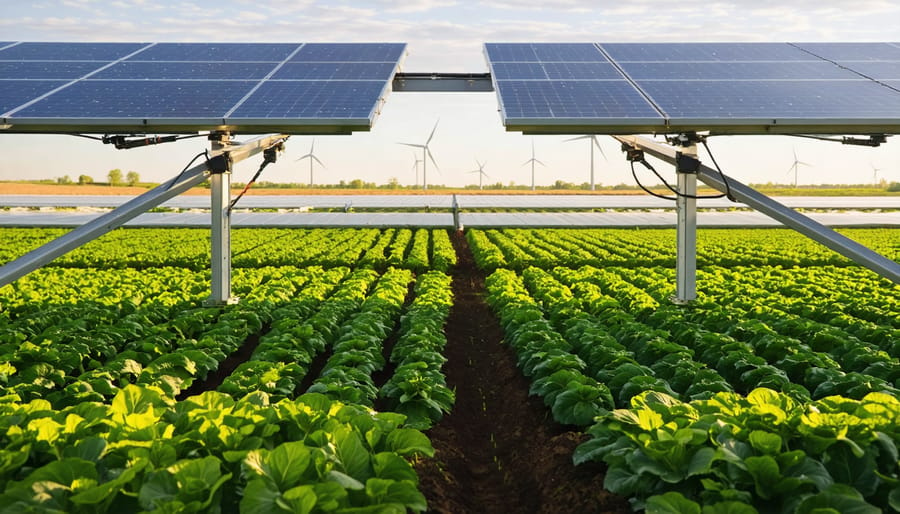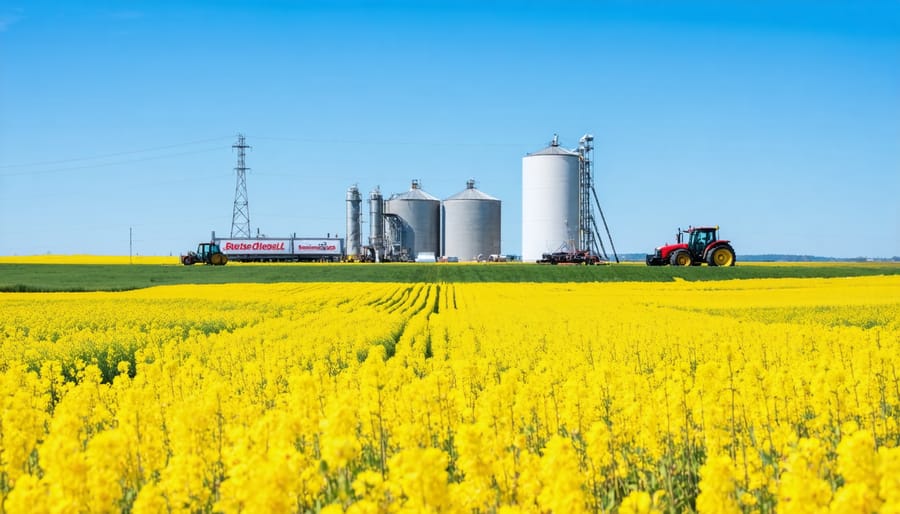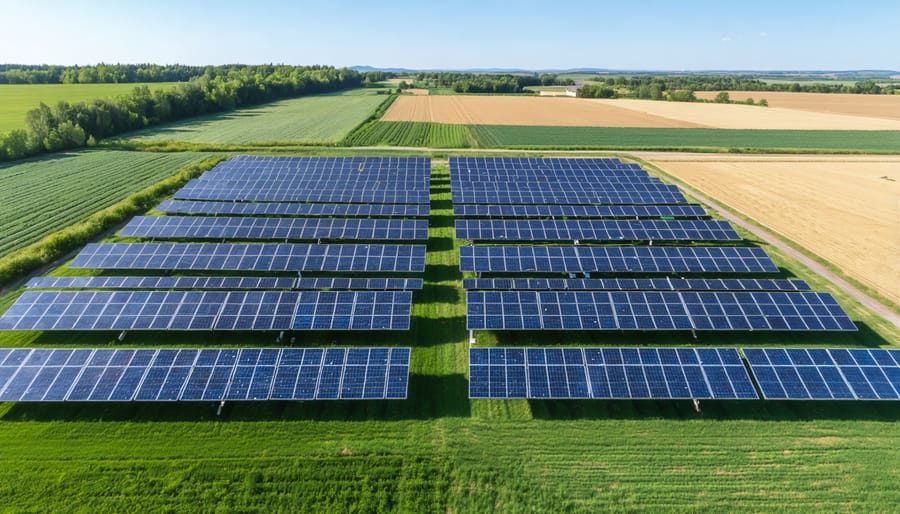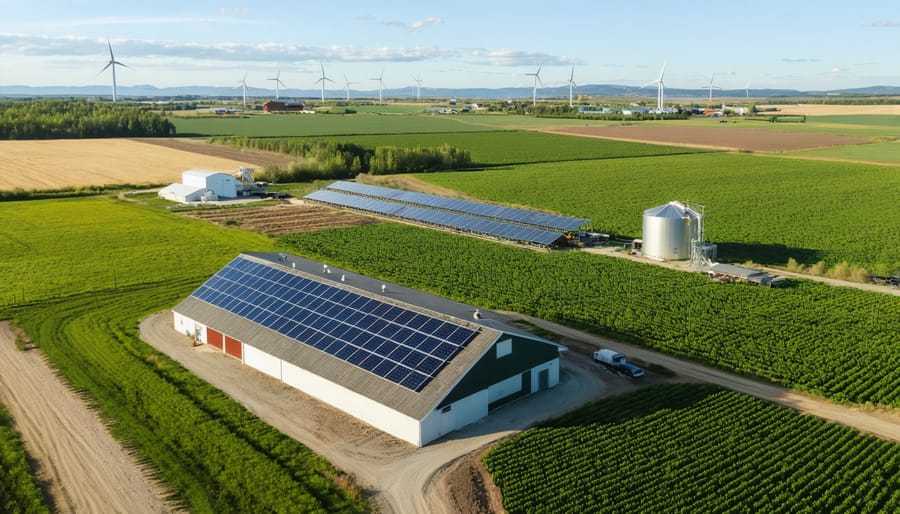Hydrogen energy stands at the forefront of Alberta’s agricultural revolution, offering farmers a powerful pathway to achieve sustainable farm solutions while maintaining productivity. Across Canadian prairies, innovative producers are integrating hydrogen fuel cells to power irrigation systems, greenhouse operations, and heavy machinery, reducing both operational costs and carbon footprints by up to 40%. This clean energy alternative not only addresses the pressing need for environmental stewardship but also positions agricultural operations for future carbon credit opportunities and government incentives. With hydrogen production costs decreasing by 30% over the past five years and new infrastructure developments across Alberta’s industrial corridors, local farmers now have unprecedented access to this transformative technology. Through practical implementation strategies and community-based knowledge sharing, Canadian agricultural operations are pioneering a sustainable future that balances economic viability with environmental responsibility.
The Promise of Hydrogen in Modern Agriculture
Clean Power for Farm Equipment
Hydrogen-powered farm equipment is revolutionizing how Alberta farmers approach their daily operations. Modern tractors and harvesters equipped with hydrogen fuel cells offer impressive power output while significantly reducing environmental impact. These machines can operate for extended periods, with refueling times comparable to conventional diesel equipment.
Local farmer James Peterson from Leduc County recently integrated a hydrogen-powered tractor into his 2,000-hectare operation. “The performance matches my diesel equipment, but I’m seeing about 30% reduction in operating costs,” he notes. The tractor operates efficiently in temperatures ranging from -30°C to +35°C, making it suitable for Alberta’s diverse climate conditions.
Several manufacturers now offer hydrogen conversions for existing equipment, making the transition more accessible for budget-conscious farmers. These adaptations maintain the familiar controls and operation while providing the benefits of clean energy. Agricultural cooperatives across the province are exploring shared hydrogen refueling stations, creating a practical infrastructure network for farm communities.
Maintenance requirements are generally simpler than traditional equipment, with fewer moving parts and no oil changes needed. This translates to reduced downtime during critical farming periods.
Greenhouse Operations and Climate Control
Hydrogen energy systems are revolutionizing greenhouse operations across Alberta, offering farmers precise control over their growing environments while reducing carbon footprints. These systems integrate seamlessly with existing climate control infrastructure, providing reliable heating and humidity management throughout our challenging Canadian winters.
Local greenhouse operator Sarah Thompson from Lacombe shares, “Since implementing hydrogen fuel cells, we’ve maintained optimal growing conditions while cutting our energy costs by 30%. The system’s waste heat is particularly valuable during cold snaps.”
The technology enables year-round production by maintaining consistent temperatures between 20-25°C and relative humidity levels of 60-70%. Hydrogen-powered systems can be scaled to suit operations from small family greenhouses to large commercial facilities, with many Alberta farmers utilizing modular installations that can grow alongside their operations.
Beyond climate control, these systems generate pure CO2 as a byproduct, which can be captured and used to enhance plant growth. This circular approach aligns with sustainable farming practices while maximizing crop yields and extending growing seasons.
Alberta’s Hydrogen Advantage

Regional Production Facilities
Alberta stands at the forefront of Canada’s hydrogen production, with several major facilities already operational and more in development. The Heartland Hydrogen Hub, located in the Industrial Heartland region northeast of Edmonton, represents one of the province’s most significant investments in hydrogen infrastructure. This facility aims to produce over 2,500 tonnes of hydrogen per day when fully operational.
In Fort Saskatchewan, Air Products Canada is constructing a landmark net-zero hydrogen energy complex, scheduled for completion in 2024. This facility will use advanced auto-thermal reforming technology to produce clean hydrogen while capturing over 95% of carbon emissions. Local farmers can expect to benefit from increased hydrogen availability for agricultural operations, including fuel for machinery and fertilizer production.
The Southern Alberta region is also seeing development, with a focus on green hydrogen production using wind and solar power. These facilities will provide farmers with access to sustainably produced hydrogen, supporting the agricultural sector’s transition to cleaner energy sources.
Looking ahead, the Alberta government has identified seven potential hydrogen nodes across the province, each strategically located to serve different regional needs. These nodes will ensure that farmers across Alberta have reliable access to hydrogen fuel and related technologies, supporting the province’s goal of becoming a leading hydrogen economy by 2030.
Distribution Networks
The distribution of hydrogen energy across Alberta’s agricultural landscape is rapidly evolving, with several key access points and delivery systems now available to farmers. Local energy cooperatives have established hydrogen fueling stations strategically positioned near major farming communities, making it easier for agricultural operations to transition to hydrogen-powered equipment. These stations are designed to accommodate both small-scale family farms and large commercial operations.
Through smart grid integration, farmers can now monitor real-time hydrogen availability and schedule deliveries based on their operational needs. Mobile delivery services have become increasingly popular, especially in remote areas where fixed infrastructure might be limited. These services use specialized tanker trucks equipped with safety systems to transport hydrogen directly to farm sites.
The Southern Alberta Alternative Energy Partnership has established a network of distribution hubs that serve as both storage facilities and educational centers. Here, farmers can learn about safe handling practices and connect with other producers who have successfully implemented hydrogen systems. Several municipalities have also partnered with agricultural cooperatives to create shared access points, reducing the initial infrastructure costs for individual farmers.
For those considering hydrogen adoption, the Alberta Clean Energy Technology Centre offers comprehensive mapping tools to help identify the nearest access points and plan for efficient delivery routes.
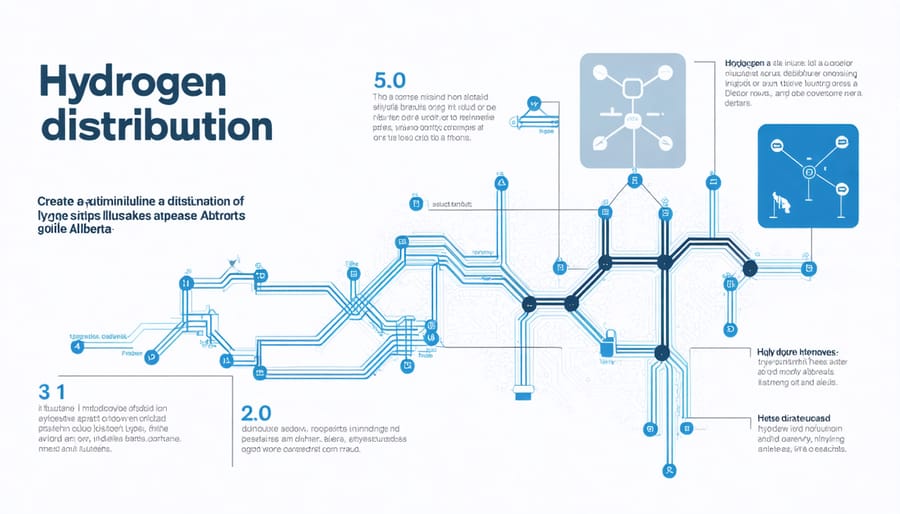
Real Farm Success Stories
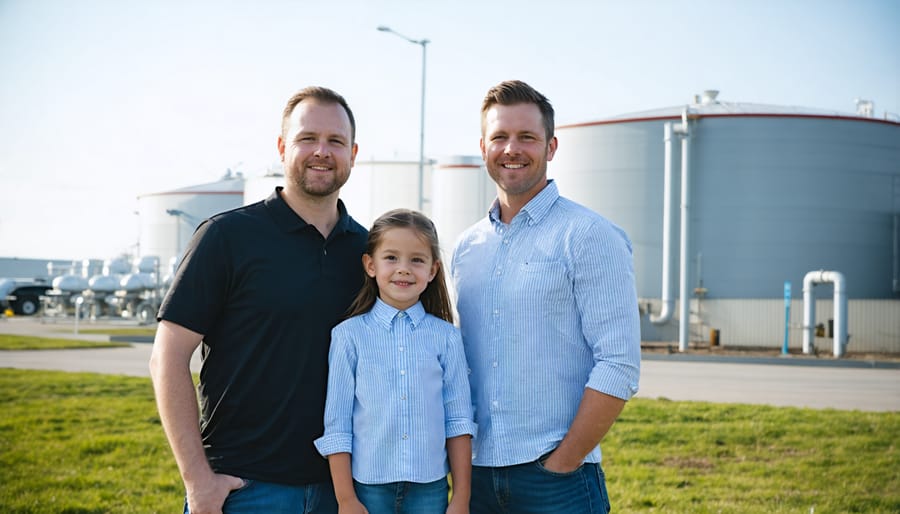
Morrison Family Farm’s Transition
The Morrison family farm, located just outside of Olds, Alberta, exemplifies a successful transition to hydrogen-integrated agriculture. Third-generation farmer Sarah Morrison and her husband Tom embarked on their hydrogen journey in 2021, initially incorporating a hydrogen-powered tractor and irrigation system alongside their regenerative farming practices.
Their 800-hectare operation now utilizes hydrogen fuel cells to power essential farm equipment, including grain dryers and greenhouse climate control systems. The transition was completed in phases over 18 months, with support from the Alberta Clean Technology Agricultural Grant Program.
The Morrisons report a 40% reduction in operational costs and a 60% decrease in carbon emissions since implementing hydrogen technology. Their success has inspired neighboring farms, leading to the formation of the Central Alberta Hydrogen Farming Coalition, which now includes 15 local farms sharing resources and knowledge.
“The initial investment was significant,” Sarah acknowledges, “but the long-term benefits to both our operation and the environment made it worthwhile. We’re now producing enough excess hydrogen to support three neighboring farms, creating an additional revenue stream we hadn’t anticipated.”
The farm regularly hosts educational tours for other agricultural professionals interested in hydrogen integration, demonstrating how traditional farming operations can successfully embrace clean energy solutions while maintaining productivity.
Cooperative Hydrogen Initiatives
In Alberta’s farming communities, cooperative hydrogen initiatives are gaining momentum as farmers join forces to make sustainable energy solutions more accessible and cost-effective. The Crossfield Agricultural Cooperative, formed by 12 local farmers, successfully implemented a shared hydrogen fueling station that services their collective fleet of hydrogen-powered tractors and farm equipment.
Similar initiatives are emerging across the province, with the Peace Region Hydrogen Alliance bringing together 25 farms to develop a regional hydrogen infrastructure network. These community-based projects not only share costs but also knowledge and resources, making the transition to hydrogen technology more feasible for individual farmers.
“Working together has been key to our success,” says Sarah Thompson, coordinator of the Lethbridge Clean Agriculture Network. “By poolging our resources, we’ve reduced individual investment costs by approximately 40% while creating a support system for troubleshooting and maintenance.”
The Red Deer Valley Hydrogen Co-op demonstrates another successful model, where members share mobile hydrogen storage units and refueling equipment. This arrangement has helped smaller farms access hydrogen technology without the substantial upfront costs of individual infrastructure.
These cooperative initiatives often qualify for additional government funding and support, with successful projects receiving up to $250,000 in matching grants through the Agricultural Clean Technology Program. For farmers considering hydrogen adoption, joining or forming a cooperative can significantly reduce barriers to entry while building valuable community partnerships.
Implementation Steps for Your Farm
Assessment and Planning
Before implementing hydrogen energy solutions on your farm, a thorough assessment of your current operations and future needs is essential. Start by evaluating your energy consumption patterns across different seasons and activities. Document your peak power requirements during crucial periods like harvest and identify areas where hydrogen technology could provide the most significant impact.
Consider your farm’s existing infrastructure and equipment compatibility. Take stock of potential storage locations for hydrogen fuel cells or electrolyzers, and assess whether your current machinery could be adapted for hydrogen use. Many Alberta farmers find it helpful to create a detailed map of their property, marking optimal locations for hydrogen infrastructure based on safety requirements and operational efficiency.
Work with local agricultural extension services or energy consultants to conduct a cost-benefit analysis. Factor in initial investment costs, potential government incentives, and long-term operational savings. Remember to consider your farm’s unique characteristics, such as proximity to hydrogen supply chains and available renewable energy sources for hydrogen production.
Create a timeline for implementation that aligns with your farm’s seasonal operations and financial capacity. This phased approach allows for manageable transitions while maintaining productivity.
Available Grants and Support
Several funding opportunities are available to support Canadian farmers transitioning to hydrogen energy solutions. The Canadian Agricultural Clean Technology Program offers grants up to $2 million for innovative clean energy projects, including hydrogen implementation. Alberta-based farmers can access additional provincial support through the Agricultural Partnership Program, which provides cost-sharing opportunities for sustainable energy initiatives.
The Emissions Reduction Alberta (ERA) fund specifically supports agricultural projects that reduce greenhouse gas emissions, with hydrogen projects qualifying for up to 50% of eligible costs. Local agricultural societies and cooperatives often provide matching funds or group purchasing opportunities to help offset initial investment costs.
For smaller operations, the Farm Energy and Agri-Processing Program offers micro-grants starting at $10,000 for energy efficiency upgrades and alternative energy solutions. Technical support and feasibility studies are available through the Agricultural Research and Extension Council of Alberta (ARECA), helping farmers assess the viability of hydrogen solutions for their specific operations.
The Canadian Agricultural Partnership’s AgriInnovate program provides interest-free loans and technical expertise for implementing new technologies. Additionally, farmers can access tax incentives through the Clean Technology Tax Credit when investing in hydrogen-related equipment and infrastructure.
Contact your local agricultural extension office or Rural Development Network representative to learn more about available funding opportunities and application deadlines.
Technical Requirements
To implement hydrogen energy systems on your farm, you’ll need specific infrastructure and equipment tailored to your operation’s scale. The basic setup includes an electrolyzer unit for hydrogen production, compression systems, and specialized energy storage solutions. For Alberta farms, reinforced storage tanks designed to withstand our extreme weather conditions are essential.
Key equipment requirements include hydrogen-ready fuel cells, safety monitoring systems, and pressure regulation devices. Your existing tractors and equipment may need retrofitting with hydrogen-compatible engines or fuel delivery systems. Installation requires proper ventilation systems and safety barriers, along with automated shut-off mechanisms.
Local regulations mandate specific safety features, including leak detection systems and emergency response equipment. Working with certified installers familiar with Alberta’s agricultural sector is crucial. They’ll help ensure your setup meets provincial standards while maximizing efficiency for your specific farming needs.
Remember to plan for maintenance access points and consider future expansion possibilities when designing your system layout. Most farmers start with a modular approach, allowing for gradual scaling as needs grow.
The adoption of hydrogen energy solutions presents a transformative opportunity for Alberta’s agricultural sector. Through implementing these innovative technologies, farmers can significantly reduce their environmental impact while maintaining or even improving operational efficiency. The evidence from early adopters across the province demonstrates that hydrogen integration can lead to substantial cost savings, particularly in fuel expenses and equipment maintenance.
For Alberta farmers considering this transition, the time to act is now. Provincial support programs and grants are available to help offset initial implementation costs, making the shift to hydrogen more accessible than ever. By joining the growing community of forward-thinking agricultural professionals, you’ll not only contribute to Canada’s environmental goals but also position your farm for long-term sustainability and success.
Take the first step by connecting with local agricultural extension offices or joining hydrogen energy information sessions offered throughout the province. These resources provide valuable insights into practical implementation strategies and potential funding opportunities. Remember, your transition to hydrogen energy doesn’t just benefit your operation – it helps strengthen Alberta’s position as a leader in sustainable agriculture.
Consider reaching out to farmers who have already integrated hydrogen solutions into their operations. Their experiences and lessons learned can provide invaluable guidance as you plan your own implementation strategy. Together, we can build a more sustainable and prosperous future for Alberta’s agricultural community.


